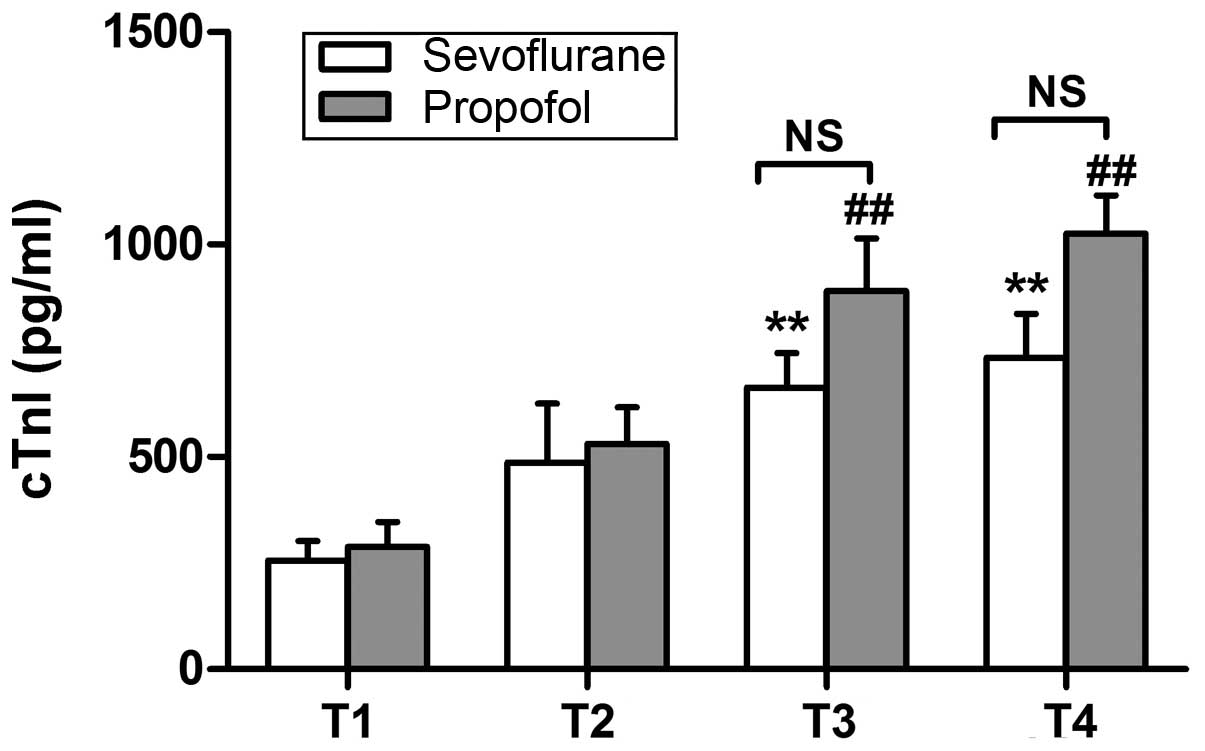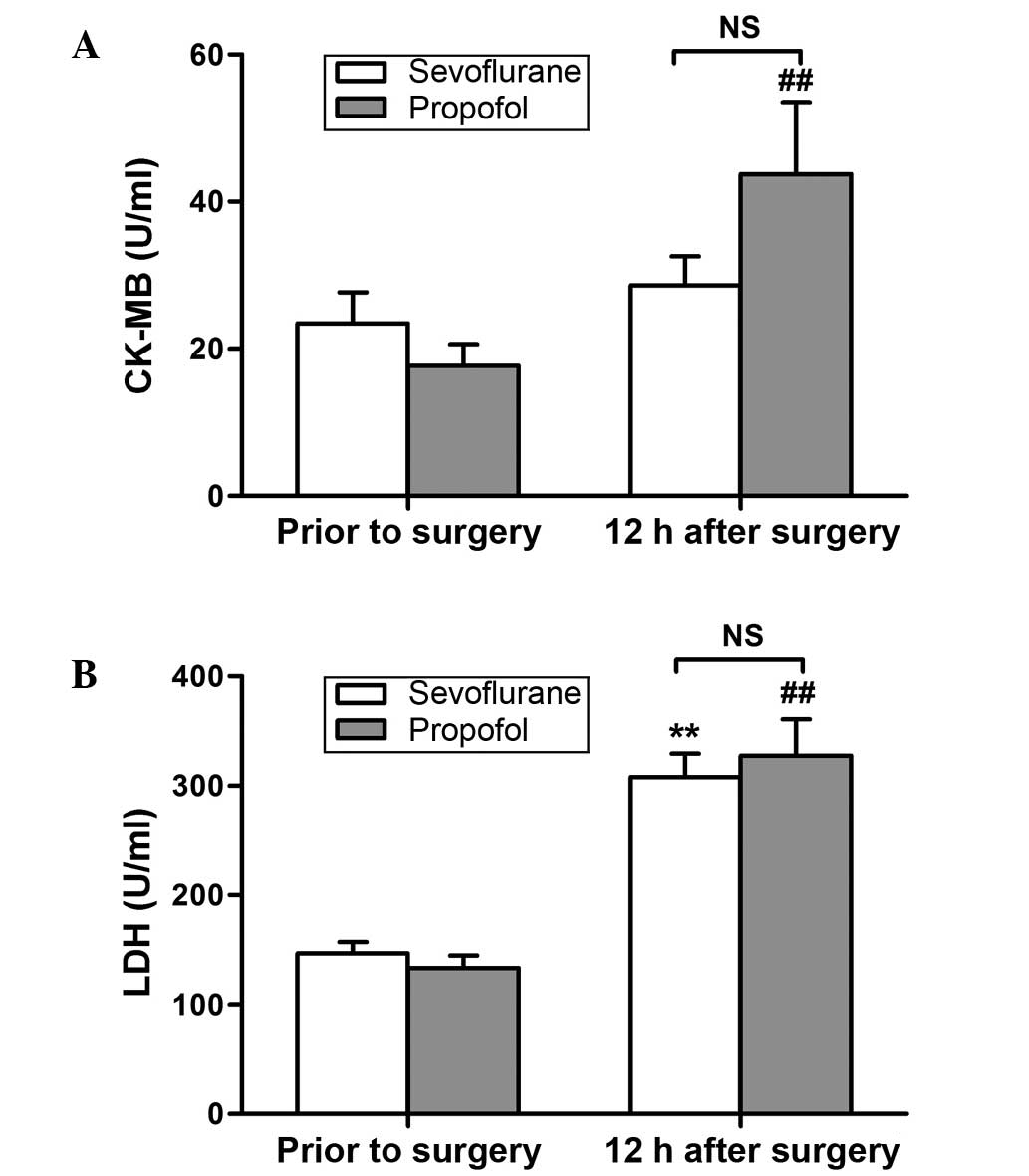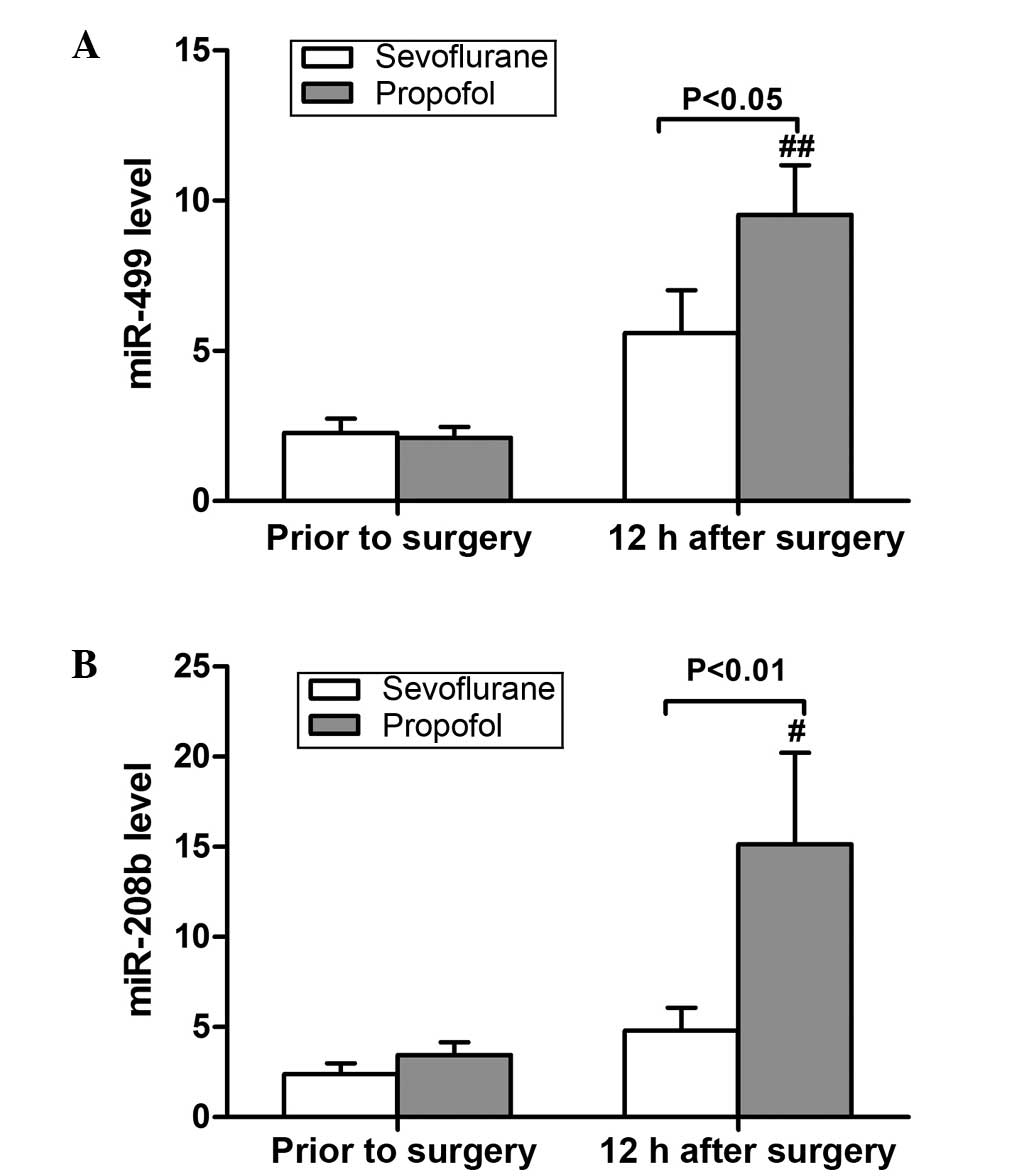|
1
|
Parissis H, Mbarushimana S, Ramesh BC,
Parissis M, Lampridis S, Mhandu P and Al-Alao B: The impact of
off-pump surgery in end-organ function: Practical end-points. J
Cardiothorac Surg. 10:1582015. View Article : Google Scholar : PubMed/NCBI
|
|
2
|
Gonenc A, Hacişevki A, Griffiths HR, Torun
M, Bakkaloglu B and Simsek B: Free radical reaction products and
antioxidant capacity in beating coronary artery surgery compared to
conventional bypass. Biochemistry (Mosc). 76:677–685. 2011.
View Article : Google Scholar : PubMed/NCBI
|
|
3
|
Leslie JB: Incidence and aetiology of
perioperative hypertension. Acta Anaesthesiol Scand Suppl. 99:5–9.
1993. View Article : Google Scholar : PubMed/NCBI
|
|
4
|
Yao YT, Fang NX, Shi CX and Li LH:
Sevoflurane postconditioning protects isolated rat hearts against
ischemia-reperfusion injury. Chin Med J (Engl). 123:1320–1328.
2010.PubMed/NCBI
|
|
5
|
Coetzee JF, Roux PJ, Genade S and Lonchner
A: Reduction of postischemic contractile dysfunction of the
isolated rat heart by sevoflurane: Comparison with halothane.
Anesth Analg. 90:1089–1097. 2000. View Article : Google Scholar : PubMed/NCBI
|
|
6
|
De Hert SG, Broecke PW, Mertens E, Van
Sommeren EW, De Blier IG, Stockman BA and Rodrigus IE: Sevoflurane
but not propofol preserves myocardial function in coronary surgery
patients. Anesthesiology. 97:42–49. 2002. View Article : Google Scholar : PubMed/NCBI
|
|
7
|
De Hert SG, Van der Linden PJ, Cromheecke
S, Meeus R, Nelis A, Van Reeth V, ten Broecke PW, De Blier IG,
Stockman BA and Rodrigus IE: Cardioprotective properties of
sevoflurane in patients undergoing coronary surgery with
cardiopulmonary bypass are related to the modalities of its
administration. Anesthesiology. 101:299–310. 2004. View Article : Google Scholar : PubMed/NCBI
|
|
8
|
Haroun-Bizri S, Khoury SS, Chehab IR,
Kassas CM and Baraka A: Does isoflurane optimize myocardial
protection during cardiopulmonary bypass? J Cardiothorac Vasc
Anesth. 15:418–421. 2001. View Article : Google Scholar : PubMed/NCBI
|
|
9
|
Julier K, da Silva R, Garcia C, Bestmann
L, Frascarolo P, Zollinger A, Chassot PG, Schmid ER, Turina MI, von
Segesser LK, et al: Preconditioning by sevoflurane decreases
biochemical markers for myocardial and renal dysfunction in
coronary artery bypass graft surgery: A double-blinded,
placebo-controlled, multicenter study. Anesthesiology.
98:1315–1327. 2003. View Article : Google Scholar : PubMed/NCBI
|
|
10
|
Fisher LA, Beckman JA, Brown KA, Calkins
H, Chaikof E, Fleischmann KE, Freeman WK, Froehlich JB, Kasper EK,
Kersten JR, et al: ACC/AHA 2007 guidelines on perioperative
cardiovascular evaluation and care for noncardiac surgery: A report
of the American college of cardiology/American heart association
task force on practice guidelines. Circulation. 116:e418–e499.
2007.PubMed/NCBI
|
|
11
|
Landoni G, Bignami E, Oliviero F and
Zangrillo A: Halogenated anaedthetics and cardiac protection in
cardiac and non-cardiac anesthesia. Ann Card Anesth. 12:4–9. 2009.
View Article : Google Scholar
|
|
12
|
Landoni G, Biondi-Zoccai GG, Zangrillo A,
Bignami E, D'Avolio S, Marchetti C, Calabrò MG, Fochi O, Guarracino
F, Tritapepe L, et al: Desflurane and sevoflurane in cardiac
surgery: A meta-analysis of randomized clinical trials. J
Cardiothorac Vasc Anesth. 21:502–511. 2007. View Article : Google Scholar : PubMed/NCBI
|
|
13
|
Hamm CW, Goldmann BU, Heeschen C, Kreymann
G, Berger J and Meinertz T: Emergency room triage of patients with
acute chest based on rapid testing for troponin T or troponin I. N
Engl J Med. 337:1648–1653. 1997. View Article : Google Scholar : PubMed/NCBI
|
|
14
|
Davies E, Gawad Y, Takahashi M, Shi Q, Lam
P, Styba G, Lau A, Heeschen C, Usategui M and Jackowski G:
Analytical performance and clinical utility of a sensitive
immunoassay for determination of human cardiac troponin I. Clin
Biochem. 30:479–490. 1997. View Article : Google Scholar : PubMed/NCBI
|
|
15
|
Lewandrowski K, Chen A and Januzzi J:
Cardiac markers for myocardial infarction. Am J Clin Pathol.
118(Suppl): S93–S99. 2002.PubMed/NCBI
|
|
16
|
Dekker MS, Mosterd A, van't Hof AW and
Hoes AW: Novel biochemical markers in suspected acute coronary
syndrome: Systematic review and critical appraisal. Heart.
96:1001–1010. 2010. View Article : Google Scholar : PubMed/NCBI
|
|
17
|
Lewis BP, Shih IH, Jones-Rhoades MW,
Bartel DP and Burge CB: Prediction of mammalian microRNA targets.
Cell. 115:787–798. 2003. View Article : Google Scholar : PubMed/NCBI
|
|
18
|
Sluijter JP, van Mil A, van Vliet P, Metz
CH, Liu J, Doevendans PA and Goumans MJ: MicroRNA-1 and −499
regulate differentiation and proliferation in human-derived
cardiomyocyte progenitor cells. Arterioscler Thromb Vasc Biol.
30:859–868. 2010. View Article : Google Scholar : PubMed/NCBI
|
|
19
|
van Rooij E, Sutherland LB, Liu N,
Williams AH, McAnally J, Gerard RD, Richardson JA and Olson EN: A
signature pattern of stress-responsive microRNAs that can evoke
cardiac hypertrophy and heart failure. Proc Natl Acad Sci USA.
103:18255–18260. 2006. View Article : Google Scholar : PubMed/NCBI
|
|
20
|
Oerlemans MI, Mosterd A, Dekker MS, de
Vrey EA, van Mil A, Pasterkamp G, Doevendans PA, Hoes AW and
Sluijter JP: Early assessment of acute coronary syndromes in the
emergency department: The potential diagnostic value of circulating
microRNAs. EMBO Mol Med. 4:1176–1185. 2012. View Article : Google Scholar : PubMed/NCBI
|
|
21
|
Devaux Y, Vausort M, Goretti E, Nazarov
PV, Azuaje F, Gilson G, Corsten MF, Schroen B, Lair ML and Heymans
S: Use of circulating microRNAs to diagnose acute myocardial
infarction. Clin Chem. 58:559–567. 2012. View Article : Google Scholar : PubMed/NCBI
|
|
22
|
Lequin RM: Enzyme immunoassay
(EIA)/enzyme-linked immunosorbent assay (ELISA). Clin Chem.
51:2415–2418. 2005. View Article : Google Scholar : PubMed/NCBI
|
|
23
|
Livak KJ and Schmittgen TD: Analysis of
relative gene expression data using real-time quantitative PCR and
the 2(−Delta Delta C(T)) Method. Methods. 25:402–408. 2001.
View Article : Google Scholar : PubMed/NCBI
|
|
24
|
Qiao S, Xie H, Wang C, Wu X, Liu H and Liu
C: Delayed anesthetic preconditioning protects against myocardial
infarction via activation of nuclear factor-κB and upregulation of
autophagy. J Anesth. 27:251–260. 2013. View Article : Google Scholar : PubMed/NCBI
|
|
25
|
Torina AG, Reichert K, Lima F, de Souza
Vilarinho KA, de Oliveira PP, do Carmo HR, de Carvalho DD, Saad MJ,
Sposito AC and Petrucci O: Diacerein improves left ventricular
remodeling and cardiac function by reducing the inflammatory
response after myocardial infarction. PLoS One. 10:e01218422015.
View Article : Google Scholar : PubMed/NCBI
|
|
26
|
Wu X, He L, Chen F, He X, Cai Y, Zhang G,
Yi Q, He M and Luo J: Impaired autophagy contributes to adverse
cardiac remodeling in acute myocardial infarction. PLoS One.
9:e1128912014. View Article : Google Scholar : PubMed/NCBI
|
|
27
|
Liu Q: Lentivirus mediated interference of
Caspase-3 expression ameliorates the heart function on rats with
acute myocardial infarction. Eur Rev Med Pharmacol Sci.
18:1852–1858. 2014.PubMed/NCBI
|
|
28
|
Zhao J, Wang F, Zhang Y, Jiao L, Lau WB,
Wang L, Liu B, Gao E, Koch WJ and Ma XL: Sevoflurane
preconditioning attenuates myocardial ischemia/reperfusion injury
via caveolin-3-dependent cyclooxygenase-2 inhibition. Circulation.
128(11 Suppl 1): S121–S129. 2013. View Article : Google Scholar : PubMed/NCBI
|
|
29
|
Yao YY, Zhu MH, Zhang FJ, Wen CY, Ma LL,
Wang WN, Wang CC, Liu XB, Yu LN, Qian LB, et al: Activation of Akt
and cardioprotection against reperfusion injury are maximal with
only five minutes of sevoflurane post-conditioning in isolated rat
hearts. J Zhejiang Univ Sci B. 14:511–517. 2013. View Article : Google Scholar : PubMed/NCBI
|
|
30
|
Zaugg M, Wang L, Zhang L, Lou PH,
Lucchinetti E and Clanachan AS: Choice of anesthetic combination
determines Ca2+ leak after ischemia-reperfusion injury in the
working rat heart: Favorable versus adverse combinations.
Anesthesiology. 116:648–657. 2012. View Article : Google Scholar : PubMed/NCBI
|
|
31
|
Samir A, Gandreti N, Madhere M, Khan A,
Brown M and Loomba V: Anti-inflammatory effects of propofol during
cardiopulmonary bypass: A pilot study. Ann Card Anaesth.
18:495–501. 2015. View Article : Google Scholar : PubMed/NCBI
|
|
32
|
Xia WF, Liu Y, Zhou QS, Tang QZ and Zou
HD: Protective effect of propofol and its relation to postoperation
recovery in children undergoing cardiac surgery with
cardiopulmonary bypass. Pediatr Cardiol. 32:940–946. 2011.
View Article : Google Scholar : PubMed/NCBI
|
|
33
|
Jovic M, Stancic A, Nenadic D, Cekic O,
Nezic D, Milojevic P, Micovic S, Buzadzic B, Korac A, Otasevic V,
et al: Mitochondrial molecular basis of sevoflurane and propofol
cardioprotection in patients undergoing aortic valve replacement
with cardiopulmonary bypass. Cell Physiol Biochem. 29:131–142.
2012. View Article : Google Scholar : PubMed/NCBI
|
|
34
|
Ballester M, Llorens J,
Garcia-de-la-Asuncion J, Perez-Griera J, Tebar E, Martinez-Leon J,
Belda J and Juez M: Myocardial oxidative stress protection by
sevoflurane vs. propofol: A randomised controlled study in patients
undergoing off-pump coronary artery bypass graft surgery. Eur J
Anaesthesiol. 28:874–881. 2011. View Article : Google Scholar : PubMed/NCBI
|
|
35
|
El Azab SR, Scheffer GJ, Rosseel PM and De
Lange JJ: Induction and maintenance of anaesthesia with sevoflurane
in comparison to high dose opioid during coronary artery bypass
surgery. Eur J Anaesthesiol. 17:336–338. 2000. View Article : Google Scholar : PubMed/NCBI
|
|
36
|
Futterman LG and Lemberg L: SGOT, LDH,
HBD, CPK, CK-MB, MB1MB2, cTnT, cTnC, cTnI. Am J Crit Care.
6:333–338. 1997.PubMed/NCBI
|
|
37
|
Law-Koune JD, Raynaud C, Liu N, Dubois C,
Romano M and Fischler M: Sevoflurane-remifentanyl versus
propofol-remifentanyl anesthesia at a similar bispectral level for
off-pump coronary artery surgery: No evidence of reduced myocardial
ischemia. J Cardiothorac Vasc Anesth. 20:484–492. 2006. View Article : Google Scholar : PubMed/NCBI
|
|
38
|
Hemmerling T, Olivier J, Le N, Prieto I
and Bracco D: Myocardial protection by isoflurane vs. sevoflurane
in ultra-fast-track anaesthesia for off-pump aortocoronary bypass
grafting. Eur J Anaesthesiol. 25:230–236. 2008. View Article : Google Scholar : PubMed/NCBI
|
|
39
|
Conzen PF, Fischer S, Detter C and Peter
K: Sevoflurane provides greater protection of the myocardium than
propofol in patients undergoing off-pump coronary artery bypass
surgery. Anesthesiology. 99:826–833. 2003. View Article : Google Scholar : PubMed/NCBI
|
|
40
|
Riess ML, Kevin LG, Camara AK, Heisner JS
and Stowe DF: Dual exposure to sevoflurane improves anesthetic
preconditioning in intact hearts. Anesthesiology. 100:569–574.
2004. View Article : Google Scholar : PubMed/NCBI
|
|
41
|
Piriou V, Mantz J, Goldfarb G, Kitakaze M,
Chiari P, Paquin S, Cornu C, Lecharny JB, Aussage P, Vicaut E, et
al: Sevoflurane preconditioning at 1 MAC only provides limited
protection in patients undergoing coronary artery bypass surgery: A
randomized bi-centre trial. Br J Anaesth. 99:624–631. 2007.
View Article : Google Scholar : PubMed/NCBI
|
|
42
|
Vikenes K, Andersen KS, Melberg T, Farstad
M and Nordrehaug JE: Long-term prognostic value of cardiac troponin
I and T versus creatine kinase-MB mass after cardiac surgery in
low-risk patients with stable symptoms. Am J Cardiol. 106:780–786.
2010. View Article : Google Scholar : PubMed/NCBI
|
|
43
|
Ekaney ML, Otto GP, Sossdorf M, Sponholz
C, Boehringer M, Loesche W, Rittirsch D, Wilharm A, Kurzai O, Bauer
M and Claus RA: Impact of plasma histones in human sepsis and their
contribution to cellular injury and inflammation. Crit Care.
18:5432014. View Article : Google Scholar : PubMed/NCBI
|
|
44
|
De Rosa S and Indolfi C: Circulating
microRNAs as Biomarkers in Cardiovascular Diseases. EXS.
106:139–149. 2015.PubMed/NCBI
|
|
45
|
Schulte C, Molz S, Appelbaum S, Karakas M,
Ojeda F, Lau DM, Hartmann T, Lackner KJ, Westermann D, Schnabel RB,
et al: miRNA-197 and miRNA-223 Predict Cardiovascular Death in a
Cohort of Patients with Symptomatic Coronary Artery Disease. PLoS
One. 10:e01459302015. View Article : Google Scholar : PubMed/NCBI
|
|
46
|
Ji X, Takahashi R, Hiura Y, Hirokawa G,
Fukushima Y and Iwai N: Plasma miR-208 as a biomarker of myocardial
injury. Clin Chem. 55:1944–1949. 2009. View Article : Google Scholar : PubMed/NCBI
|
|
47
|
Reddy A, Zheng Y, Jagadeeswaran G, Macmil
SL, Graham WB, Roe BA, Desilva U, Zhang W and Sunkar R: Cloning,
characterization and expression analysis of porcine microRNAs. BMC
genomics. 10:652009. View Article : Google Scholar : PubMed/NCBI
|
|
48
|
Gidlöf O, Andersson P, van der Pals J,
Götberg M and Erlinge D: Cardiospecific microRNA plasa levels
correlate with troponin and cardiac function in patients with ST
elevation myocardial infarction, are selectively dependent on renal
elimination and can be detected in urine samples. Cardiology.
118:217–226. 2011. View Article : Google Scholar : PubMed/NCBI
|
|
49
|
Olivieri F, Antonicelli R, Lorenzi M,
D'Alessandra Y, Lazzarini R, Santini G, Spazzafumo L, Lisa R, La
Sala L, Galeazzi R, et al: Diagnostic potential of circulating
miR-499-5p in elderly patients with acute non ST-elevation
myocardial infarction. Int J Cardiol. 167:531–536. 2013. View Article : Google Scholar : PubMed/NCBI
|
|
50
|
Gidlof O, Smith JG, Miyazu K, Gilje P,
Spencer A, Blomquist S and Erlinge D: Circulating cardio-enriched
microRNAs are associated with long-term prognosis following
myocardial infarction. BMC Cardiovasc Disord. 13:122013. View Article : Google Scholar : PubMed/NCBI
|
|
51
|
Corsten MF, Dennert R, Jochems S,
Kuznetsova T, Devaux Y, Hofstra L, Wagner DR, Staessen JA, Heymans
S and Schroen B: Circulating MicroRNA-208b and MicroRNA-499 reflect
myocardial damage in cardiovascular disease. Circ Cardiovasc Genet.
3:499–506. 2010. View Article : Google Scholar : PubMed/NCBI
|
|
52
|
Ishikawa M, Tanaka S, Arai M, Genda Y and
Sakamoto A: Differences in microRNA changes of healthy rat liver
between sevoflurane and propofol anesthesia. Anesthesiology.
117:1245–1252. 2012. View Article : Google Scholar : PubMed/NCBI
|
|
53
|
Tanaka S, Ishikawa M, Arai M, Genda Y and
Sakamoto A: Changes in microRNA expression in rat lungs caused by
sevoflurane anesthesia: A TaqMan® low-density array study. Biomed
Res. 33:255–263. 2012. View Article : Google Scholar : PubMed/NCBI
|

















